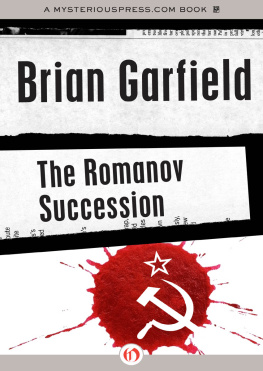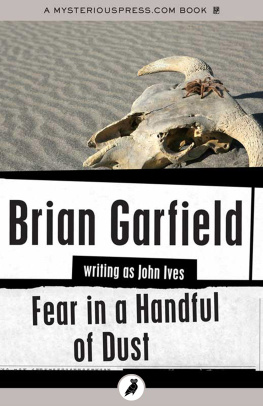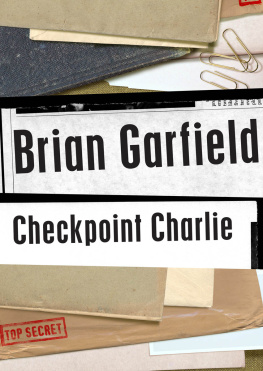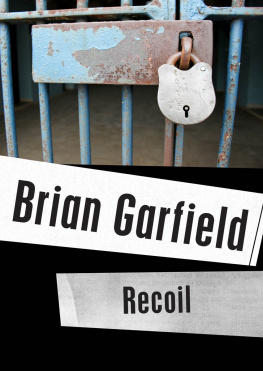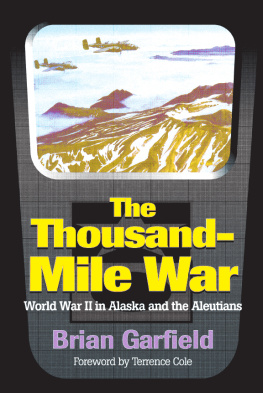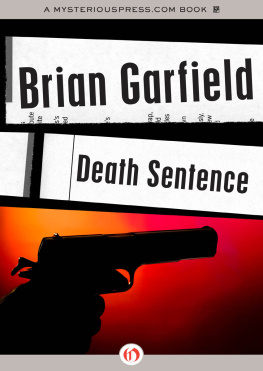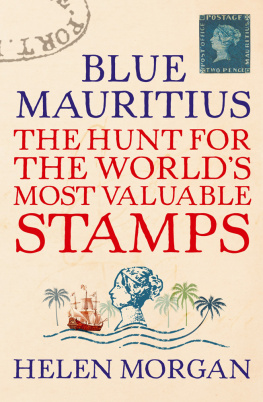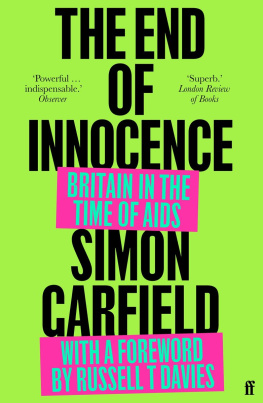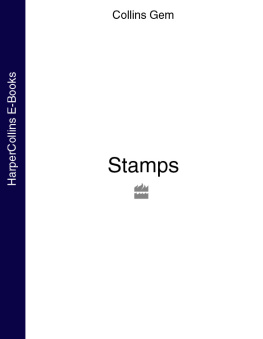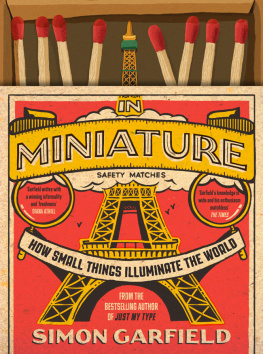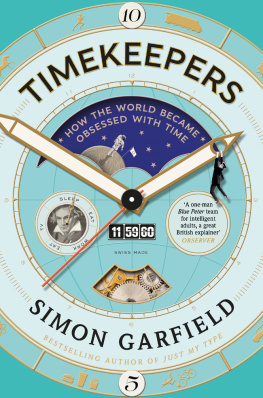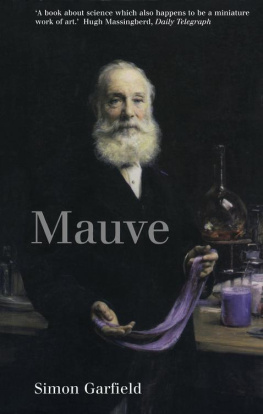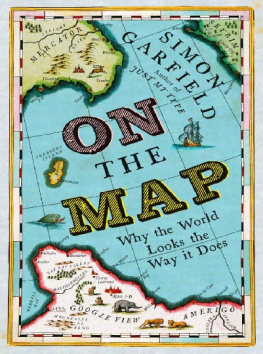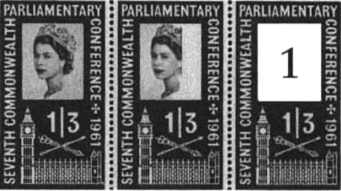First U.S. edition
Copyright 2008 by Simon Garfield
All rights reserved
For information about permission to reproduce selections from this book, write to or to Permissions, Houghton Mifflin Harcourt Publishing Company, 3 Park Avenue, 19th Floor, New York, New York 10016.
www.hmhco.com
First published in Great Britain in 2008 by Faber and Faber Ltd
Library of Congress Cataloging-in-Publication Data
Garfield, Simon.
The error world: an affair with stamps/Simon Garfield.1st ed.
p. cm.
1. Garfield, Simon. 2. Stamp collectorsEnglandLondonBiography. 3. Authors, English20th centuryBiography. 4. JournalistsEnglandLondonBiography. 5. Postage stampsErrorsEnglandLondon. I. Title.
HE 6207. G 37 A 3 2008 769.56092dc22 [B] 2008026086
ISBN 978-0-15-101396-8
e ISBN 978-0-547-58670-0
v2.1215
For Julian and Mandy
The Perfect Stamp
Little do wives know how much men spend on their hobbies. But my wife is about to find out.
It is almost one oclock on 22 November 2006, a Wednesday. Im standing just inside the door of my marriage guidance counsellors house in north London. I have a stamp album under my arm and I am in all kinds of troubleemotional, financial, philatelica situation I couldnt have imagined two years before.
My marriage is over, but the reasons are still unravelling.
We have drifted apart over the years. I have fallen in love and Im having an affair. I have developed a passion for someone I loved when I was young, and for something I loved when I was a child. I am forty-seven, and I cant concentrate on anything for very long.
I have built up a stamp collection I can barely afford, and it has brought me to the brink of ruin. The affair and my stamps, the two secrets that have brought me here to a small room in the shadow of Alexandra Palace, are not unconnected, for both are quests for meaning, the classic mid-life dilemma. For my marriage guidance counsellor the affair is a commonplace: a lack of intimacy and honesty with my wife, a beautiful woman who has rejuvenated my days and made me feel attractive, hotel rooms. But the stamps are something unusual.
Collecting fills a hole in a life, and gives it a semblance of meaning. When men get together to talk about their passions, we dont just talk about what we loveour cars, our sports, our romantic yearningsbut also how much these desires have cost us, and what we have lost. We try to regain what we cannot. We talk about the one that got awaythe prized possessionas if that would have made everything right.
Little do wives know: I first heard this phrase from Michael Sefi, the keeper of the Queens stamps. Then there were similar observations from the head of an auction house and my stamp dealer. They often spun a web of secrets for their clients, something they called discretion. My philatelic icon, a man who had the heroic name Sir Gawaine Baillie, had built up a collection worth more than ten million pounds, but his wife thought it was worth 800,000.
In the past I have wondered whether my affair was a sort of hobby too, a diversion from reality, a club of extreme enthusiasm. We loved talking about our love, and would sometimes talk of nothing else, shutting out the world with our own code. We knew it wasnt harmless, and that devastating and far-reaching things would surely follow, but we considered ourselves above life itself.
I found it easier to talk about my affair than my stamps. I was actually proud of it, even in front of my wife. In my mid-forties I could still ignite passion in myself and in another; better, it was a passion I had never felt before. And anyone could understand these emotions, the stuff of books and films, and of a million lucky lives. But stamps? Used postage? Who could be passionate about that? And who could explain it?
I told my wife of my affair in a straightforward way, on a walk along the Kent coast one afternoon, and things moved swiftly from there. Within a week I was sleeping in my office, within a month in a rented flat. There is a practical way these things advance, a clinical order to offset the hurt and anger and tears. There is professional help to call upon. But an affair with stampsstamps as a mistress, just as uncontrollable as the wildest edge of obsessive lovethat might take half a lifetime to understand.
My wife still doesnt appreciate my stamps, but my marriage guidance counsellor, who I shall call Jenny, is making a good attempt. After our session this lunchtime I have an appointment at an auction house, not to buy but to sell, a meeting that will place a monetary value on my private hobby, which in turn will affect my immediate future and the level of extended mortgages and maintenance payments. Rather than leave my stamps in my car I have brought them in, and I am opening the cover for Jenny to examine.
She is bored out of her mind in less than thirty seconds. She doesnt even feign interest. I say, Look at this one, it lacks olive-green! She says, I know they mean a lot to you.
I dont collect ordinary stamps. I collect stamps with errors, with absent colours, with printing faults. It doesnt take long for my marriage guidance counsellor to make the connection between what I collectstamps with bits missingand my family history, which has been a life with people missing. I mention to her that Freud considered collecting as compensation for loss, and she nods. She doesnt understand the beauty of the stamps in my album, but she can see that selling them is a great loss, another imminent separation.
Six years before, stamps were nothing in my world. I gave them no more thought than other childhood things. But I have since found that stamps possess a force greater than their subtle charms suggest, and that no objects so public have permeated my life with such effect.
Stamps dont leave you. They are not like people. They are like grief, always there, first as wonders at the end of a post office queue, and in later life as a silent link to the past. Aesthetically they may bring me to tears. Socially they may embarrass me (You collect stamps? You? Who once followed The Clash on tour?) And financially they have the power to bankrupt me.
Which is how I ended up in this doorway, the end of a 50 session, 40,000 worth of stamps in an album under my arm, barely able to look at my wife, an appointment at an auction house in ninety minutes, and aware as never before of how much of my life has been casually transformed by small and beautiful things that most people are more than happy just to stick on an envelope and send away.
In 1968 I had a crush on a girl who was frightened of the Post Office Tower. The girl, Melanie Kilim, aged ten, was the sister of my best friend, and even as an eight year old I understood this relationship to have the potential of something socially complicated. The crush passed, I dont think I even held her hand, and now I hardly see her. But my friendship with her brother endured, and we meet every week to talk of work and children. Forty years have passed, and our lives have changed a great deal. But one thing holds firm: his sister Melanie is still frightened of the Post Office Tower.
One evening in April 2005, when I had just turned forty-five, I called her up about it out of the blue. Hi Melanie, this is Gus. Gus was my school nickname. Its been quite a while, but I want to ask you about something Ive always wondered about... Melanie was forthcoming. She said her phobia began not long after the building went up in 1965, transforming and modernising the London skyline. She thought her fear of it might have something to do with the Daleks in Dr Who,
Next page

